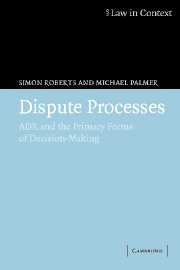Book contents
- Frontmatter
- Contents
- Preface
- Acknowledgements
- 1 Introduction
- 2 Cultures of Decision-making: Precursors to the Emergence of ADR
- 3 The Debates Around Civil Justice and the Movement Towards Procedural Innovation
- 4 Disputes and Dispute Processes
- 5 Negotiations
- 6 Mediation
- 7 Umpiring
- 8 Hybrid Forms and Processual Experimentation
- 9 The Trajectory of Alternative Dispute Resolution
- Bibliography
- Index
2 - Cultures of Decision-making: Precursors to the Emergence of ADR
Published online by Cambridge University Press: 05 June 2012
- Frontmatter
- Contents
- Preface
- Acknowledgements
- 1 Introduction
- 2 Cultures of Decision-making: Precursors to the Emergence of ADR
- 3 The Debates Around Civil Justice and the Movement Towards Procedural Innovation
- 4 Disputes and Dispute Processes
- 5 Negotiations
- 6 Mediation
- 7 Umpiring
- 8 Hybrid Forms and Processual Experimentation
- 9 The Trajectory of Alternative Dispute Resolution
- Bibliography
- Index
Summary
Introduction
In this chapter we begin by marking out, in broad schematic terms, the larger background to the emergence of ADR in the latter part of the twentieth century. This apparently abrupt shift towards what we have loosely identified as a ‘culture of settlement’ came at the end of a long period during which the lawyer and the judge had emerged as central figures in disputing. The entrenchment of institutions of formal justice, closely associated with the maturity of the nation state, resulted in other foundational institutional forms being marginalised and lost sight of. But these institutional forms, and the values associated with them, were always somewhere in the picture; and as Auerbach (1983), Abel (1982a, 1982b) and Nader (1986) have suggested, a panoramic view would show something of an episodic alternation between values of ‘formalism’ and ‘informalism’. Some sense of this larger picture, inevitably casting doubt upon contemporary claims to radical innovation, provides a necessary context for understanding the contemporary transformation of disputing under the leitmotiv of Alternative Dispute Resolution.
While, as we shall see in Chapter Three, self-conscious efforts to ‘find a better way’ (Burger, 1982) of dealing with civil disputes have in part shaped the ADR movement, co-option by government, large business interests and expansive professional agendas are also important in the movement's emergence and growth. The largely unchallenged critiques of ‘informal justice’ appearing at the beginning of the 1980s deserve careful examination today.
- Type
- Chapter
- Information
- Dispute ProcessesADR and the Primary Forms of Decision-Making, pp. 9 - 44Publisher: Cambridge University PressPrint publication year: 2005



